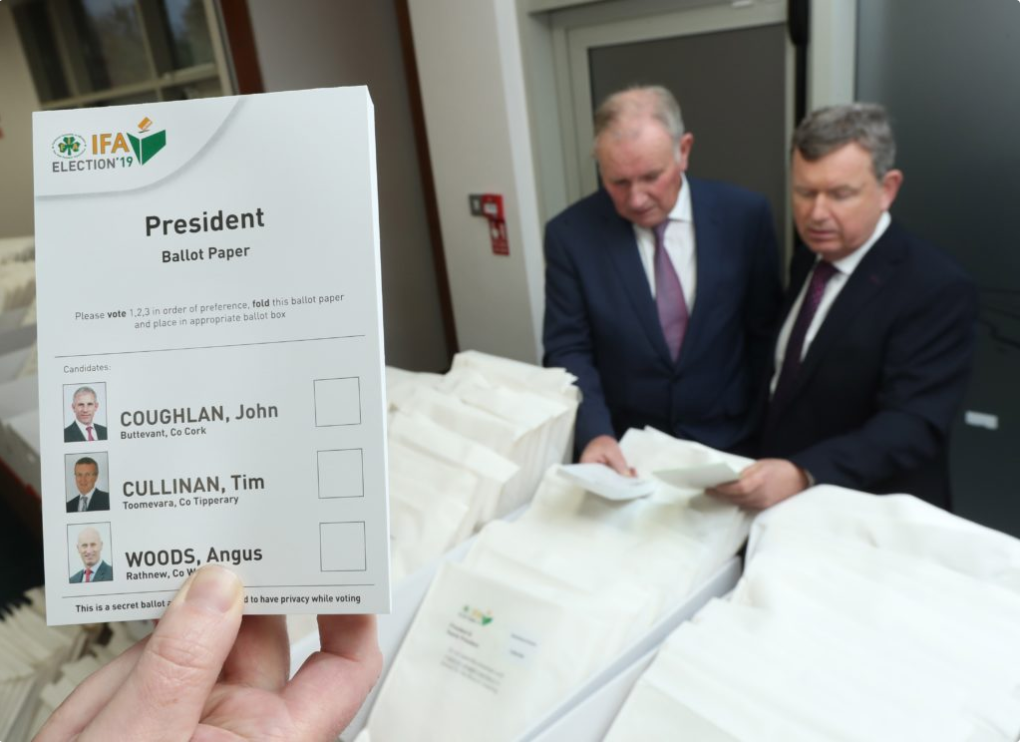The Irish Farmers’ Association (IFA) is due to decide tomorrow (Thursday, July 27) whether to move to an entirely postal vote for its upcoming national elections.
The proposal is part of a range of potential reforms of the farming organisation being considered by IFA National Council.
The change, which will require approval by two thirds of the council in order to be passed, would mean that IFA members would have a postal ballot sent to them.
The ballot would then have to be returned by post ahead of a certain deadline for the elections.
Postal vote
A total of 22,998 votes were cast by members of the IFA in the 2019 presidential election.
The organisation claims to have a total membership of approximately 72,000 members – meaning that the turnout in that election was just below 32%.
Moving to a postal ballot is seen by many in the IFA as a way to boost voter numbers.
However, Agriland understands that concerns have been raised by some members of the council about moving voting away entirely from the tradition of voting in the association’s 945 branches across the country.
As a result, it seems uncertain if the proposal will reach the threshold required to be passed.
There are also suggestions that an amendment could be tabled which would entail a “hybrid model” whereby votes could be cast both through the post and at branch level.
If neither option is accepted by the council, then the status quo of members having to cast their vote at their branch will continue.

Frank Brady, IFA Ulster / North Leinster Regional chair, told Agriland he was in favour of a hybrid approach as the postal ballot could improve voter turnout, without undermining the role of branches.
Brady said the use of an entirely postal vote in the IFA Ulster / North Leinster Regional chair election in 2021 helped to boost turnout to 80%, but he did note that ballot was on a smaller scale.
He said that any changes must be for the betterment of the organisation.
Brady also pointed to the need for the IFA to connect with the younger generation of members.
Sean Lavery, chair of Limerick IFA, stressed the role of the branch network within the IFA, adding it was important that people have a reason to go to their branch meeting for voting.
While Kenny Jones, chair of Kerry IFA, felt that “having a meeting every four years won’t save branches” and more would be needed to reinvigorate the network.
Chair of the IFA Grain Committee, Kieran McEvoy said that using a postal vote is a good idea and could help turnout.
He added that the organisation needs to examine why people are not going to branch meetings.
IFA
Several other proposals will be voted on by the IFA National Council during tomorrow’s meeting.
This includes extending the terms for the IFA president and deputy president to one four-year term, rather than the current arrangement of two, two-year terms.
For an election to be called during that period, half of national council would have to be in agreement to force a ballot.
The council will also decide whether to co-opt three extra people onto the IFA National Officers Committee (NOC).
It is understood that these people would be part of the association or be from a farming background.
The committee would also be granted additional roles and responsibilities under the proposal.
Additionally, the national council wants to split the position of national treasurer/returning officer into two separate roles.
